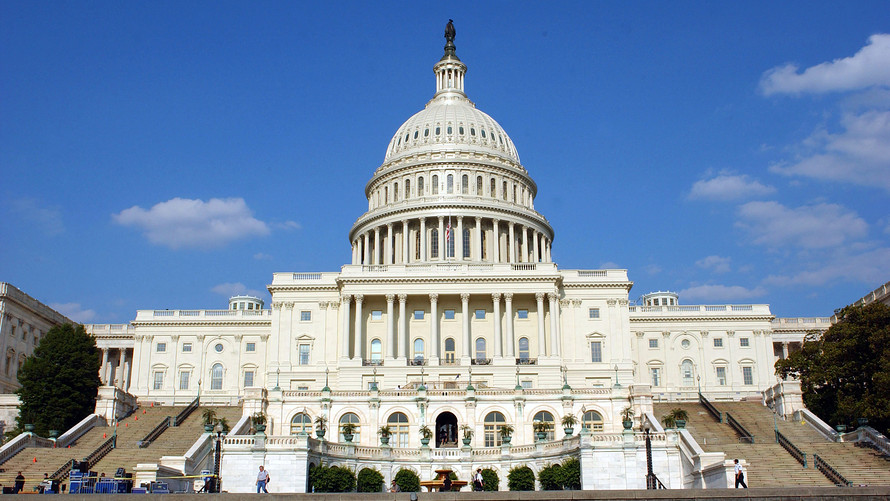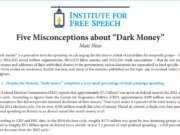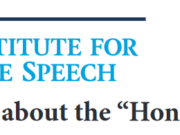By Eric Wang, Senior Fellow[1]
One way to better understand how H.R. 1 would affect nonprofit civic and advocacy groups is to apply its provisions to common advocacy and operating activities of these organizations. The massive elections and campaign finance bill has many provisions that are difficult for even campaign finance attorneys to understand. This guide supplements the in-depth analyses of H.R. 1 that the Institute for Free Speech has released previously.[2]
H.R. 1 Would Make it Harder for Groups to Speak About the Federal Government
● More Lawyers’ Fees and Government Regulations, Less Speech. H.R. 1 would vastly increase the legal compliance costs and risk for speaking about federal issues. Assuming groups can even afford to hire an attorney each time they wish to speak, paying more money to lawyers means fewer resources left to work for better government.
○ H.R. 1 would require groups speaking about federal candidates and elected officials to file duplicative reports with the Federal Election Commission (i.e., new reports in addition to the pre-existing reports required, many of which would report the same activities), which increases the costs of speaking.
○ H.R. 1 would regulate a new category of speech – communications that “promote,” “attack,” “support,” or “oppose” (“PASO”) federal candidates and elected officials. Under this broad and vague standard, groups that merely speak about federal legislation or policy issues could be forced to file FEC reports that they didn’t have to file before.
○ The PASO standard applies year-round, even in non-election years. It would give major headaches to any group that speaks on public issues. One huge headache is whether the speech would even be legal under the new coordination provisions in the bill.
► Example: A group of Venezuelan émigrés, who are now naturalized U.S. citizens, takes out an ad: “President Trump has recognized the new Interim Government of Venezuela. We thank the President for this action and ask all Americans to support the return of democracy to our country of birth.” Would the FEC deem that an ad “promoting” or “supporting” President Trump? The group must consult an attorney to determine whether the ad would be regulated as a PASO communication under H.R. 1.
● Compulsory Declarations of Allegiance. H.R. 1 would require groups speaking about legislative and policy issues to file FEC reports for “campaign-related disbursements.” These reports would be due even if the speech would have no impact on any election campaign and was made in a year without an election. Groups would be compelled to declare on those reports whether their speech “supports or opposes” any federal candidate or elected official mentioned in the communication, even if the group is merely supporting, opposing, or is neutral about the issue and takes no position on the candidate or elected official.
► Example: A pro-choice group spends more than $10,000 on a radio ad calling on President Trump, Speaker Pelosi, and Senate Majority Leader McConnell to work together to protect abortion rights. Under H.R. 1’s broad and vague PASO standard, it has been determined this ad is a “campaign-related disbursement.” Therefore, the group must declare on its FEC report whether it “supports” or “opposes” Trump, Pelosi, and McConnell, even if the group does neither.
● Longer Disclaimers, Less Speech, and Donor Deterrence.R. 1 would decrease the amount of speech that groups can engage in by increasing the length of mandatory government speech in their messages and requiring those messages to identify donors.
○ H.R. 1 would expand the length of the disclaimers for “independent expenditures,” “electioneering communications,” and the new category of regulated speech known as “campaign-related disbursements.” Many of the existing disclaimers in federal law are already too long. H.R. 1 would make this problem even worse.
○ H.R. 1 would additionally require groups to identify their top 5 donors of $10,000 or more in their disclaimers (or top 2 for audio-only ads), even if those donors gave money for purposes other than to fund the ad. This would divert attention away from a group’s message to its individual donors and members and worsen the politics of personal destruction and harassment. It would also lead many donors to cut off their financial support.
○ H.R. 1 would additionally require an organization’s CEO or highest-ranking official to personally appear and identify himself or herself and recite part of the disclaimer in audio and video ads. Again, this would worsen the politics of personal destruction and harassment by focusing attention on a group’s leader rather than on a group’s message.
► Example: An environmental group sponsors a 30-second radio ad calling on President Trump to reduce air pollution. It must include the following 18-second disclaimer (the italicized portion must be read by the group’s president):
Paid for by Americans for the Environment, cleanenvironment.org. Not authorized by any candidate or candidate’s committee. I am Jane Doe, the President of Americans for the Environment and Americans for the Environment approves this message. Top two funders are FIRST NAME 1 LAST NAME 1 AND FIRST NAME 2 LAST NAME 2.
● Your Website and Facebook and Twitter Accounts May be Regulated by the FEC.R. 1 would regulate any online or social media communication if it is a “paid internet, or paid digital communication.” This is a clear departure from the FEC’s existing regulation of only paid online advertising.
○ Groups that use paid staff to post unpaid content on their own website or social media pages/feeds/channels could be subject to the disclaimer and reporting requirements discussed above if their content is regulated.
► Example: Staff at a fiscal responsibility group post content on the group’s website and social media pages/feeds/channels about the voting records and positions of members of Congress on the budget deficit and national debt. The content is determined to PASO those members and must include FEC disclaimers. When the total value of the staff time exceeds $10,000 in a two-year period defined in the bill, the group is required to file the FEC reports discussed above.
● More Surveillance of Online and Social Media Communications. H.R. 1 would subject groups that spend as little as $500 on online ads to additional surveillance by government officials and opponents.
○ Large online platforms would have to maintain a publicly accessible database (“public file”) for any online advertising that costs more than $500 that addresses any “national legislative issue of public importance.” The public file must include a copy of the ad and details about how the ad was targeted and distributed, the rates that were charged, the candidates and issues discussed in the ad, and contact information and details about the person who ran the ad or the sponsoring group’s directors and officers.
○ The public file will assist antagonistic government officials and other opponents in keeping tabs on what individuals or civic and advocacy groups are doing online. It would also enable opponents of organizations’ views to take retaliatory actions.
► Example: A local LGBTQ rights group in a very conservative state spends $500 on a small social media campaign urging removal of the ban on transgender people serving in the military. The organization’s opponents use information in the public file to attack the group and urge employers of its officers and directors to fire those individuals.
● Speech Bans. H.R. 1 would define a large universe of speech as “coordinated” with federal candidates and elected officials even if the speech is not, in fact, coordinated, and even if elected officials or candidates are not named in the communications. Such so-called “coordinated” speech about national issues would be banned if done by incorporated nonprofit groups or unions.
○ H.R. 1 would treat certain public communications as being “coordinated” with federal candidates or elected officials based on a broad range of conversations that groups may have with candidates, elected officials, or their staff. This includes discussions solely about policy and how to get the public involved.
○ Groups also could be deemed to be coordinating if their staff or vendors have certain prior relationships with candidates or elected officials in the small community of political vendors and consultants. Even a former summer intern who worked four years ago for a person who was later elected to Congress could trigger the ban.
○ As a result of H.R. 1’s expansive coordination standard, groups would be effectively prohibited from making many communications that:
■ Urge the election or defeat of candidates;
■ Refer to a candidate or elected official; or
■ Are deemed to “PASO” a candidate or elected official, even if the communication does not mention any candidate or elected official.
○ Directors and officers of groups could be held personally liable for coordination violations, which means many leaders or would-be leaders of nonprofit groups may simply resign or refuse to serve.
► Example: A group advocating gun control meets with the chief of staff of Rep. Doe, who chairs a subcommittee of the Judiciary Committee, to discuss the Bipartisan Background Checks Act of 2019. The chief of staff suggests it would be helpful to shore up public and congressional support for the group’s agenda if the group ran a PR campaign. The group retains a PR consultant who, unbeknownst to the group, worked on Rep. Doe’s unsuccessful gubernatorial campaign two years ago.
The group runs ads in all of the Committee members’ districts asking constituents to either thank their representatives for standing up for common sense gun control or to tell their representatives to support such reforms. The ads in Rep. Doe’s district cost $50,000. Under H.R. 1, the ad is deemed to be coordinated and would count as a contribution to Rep. Doe. Because the group is a nonprofit corporation, it may not contribute to any candidate, and the FEC fines the group at least $25,000 (the agency’s typical fine for prohibited contributions). Under the FEC’s customary practice, the group or Rep. Doe’s campaign committee also may be required to disgorge the $50,000 at issue to the U.S. Treasury.
H.R. 1 Would Intrude on Groups’ Donor and Associational Privacy
● Violating Privacy in Association and Facilitating Harassment. H.R. 1 would compel groups to publicly identify certain of their donors on FEC reports if they spend more than $10,000 during a two-year election cycle on “campaign-related disbursements.” (This is in addition to the donor identification disclaimer requirements discussed above.)
○ A group’s donor list contains sensitive information that has long been protected under the law, except if a group is a PAC with the major purpose of election advocacy, or if donors give specifically to fund election advocacy.
○ Activists have been vilifying donors to policy and political organizations and calling for reprisals against them. If it became law, H.R. 1 would enable more of such activities and lead many donors to cut off their financial support for organizations.
► Example: A pro-life group is forced to identify certain of its donors on the group’s FEC reports for “campaign-related disbursements.” Opponents of the group’s policies gather at those donors’ homes and businesses, yelling offensive and threatening invectives at those donors and their families and calling for the donors to be fired from their jobs.
H.R. 1 Would Subject Groups to Politically Motivated FEC Investigations
● Creating a Speech Czar and Enabling Partisan Enforcement. The scandal over the IRS’s targeting of Tea Party groups could look like just the tip of the iceberg if H.R. 1 were to pass.
○ H.R. 1 would give a Speech Czar at the Federal Election Commission that is hand-picked by the president even more free reign than existed at the IRS.
○ H.R. 1 would transform the bipartisan, six-commissioner agency into a partisan, five-commissioner agency. It would give the FEC Chair broad powers to issue subpoenas without the support of any other commissioner, expand the agency general counsel’s powers to initiate investigations even without a vote of the commissioners, and weaken the rights of the accused.
○ No advocacy group would be safe from politically motivated investigations into federal advocacy activities that have any relation to the FEC’s jurisdiction.
► Example: Opponents file a politically motivated FEC complaint against a civil rights group alleging illegal coordination with elected officials. Existing law provides for a six-member, bipartisan FEC (no party may have more than three commissioners) and requires a majority of commissioners (typically four) to approve investigations. But under H.R. 1, the FEC would be reduced to five members, with one of them being a nominal “independent” who is likely to support one party over the other. Or the agency could have two vacancies and do anything it wants on a partisan vote. The FEC general counsel also would be able to issue subpoenas for the group’s communications and documents when only two of the five commissioners object.
[1] Eric Wang is also Special Counsel in the Election Law practice group at the Washington, D.C. law firm of Wiley Rein, LLP. Any opinions expressed herein are those of the Institute for Free Speech and Mr. Wang, and not necessarily those of his firm or its clients.
[2] See Eric Wang, Analysis of H.R. 1 (Part One): “For the People Act” Replete with Provisions for the Politicians, Institute for Free Speech (Jan. 23, 2019), at https://www.ifs.org/wp-content/uploads/2019/01/2019-01-23_IFS-Analysis_US_HR-1_DISCLOSE-Honest-Ads-And-Stand-By-Every-Ad.pdf; Bradley A. Smith, Analysis of H.R. 1 (Part Two): Establishing a Campaign Speech Czar and Enabling Partisan Enforcement: An Altered FEC Structure Poses Risks to First Amendment Speech Rights, Institute for Free Speech (Jan. 31, 2019), at https://www.ifs.org/wp-content/uploads/2019/01/2019-01-31_IFS-Analysis_US_HR-1_Creating-A-Partisan-FEC.pdf; and Bradley A. Smith, Analysis of H.R. 1 (Part Three): New Restrictions Target Speech by All Groups Under the Guise of “Stopping Super PAC-Candidate Coordination,” Institute for Free Speech (Feb. 5, 2019), at https://www.ifs.org/wp-content/uploads/2019/02/2019-02-03_Smith-Analysis_US_HR-1_Coordination-Restrictions.pdf.














